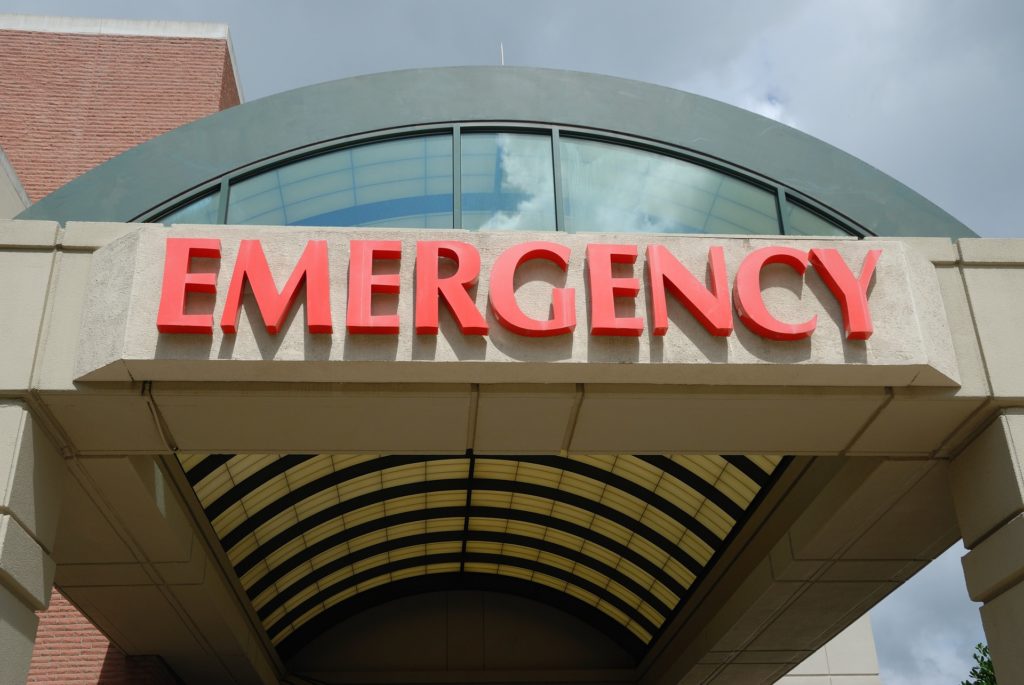Blast | November 03, 2022

“Revival” by Craig Reinbold
BLAST, TMR’s online-only prose anthology, features prose too vibrant to be confined between the covers of a print journal. In our latest installment we bring you “Revival” by Craig Reinbold. Reinbold, a Milwaukee-area ER nurse, writes with striking insight and objectivity about his firsthand experience with opioid overdose cases.
Revival
Craig Reinbold
Opioid overdoses might break your heart, but they aren’t usually fatal. I think of the forty-year-old who took all his Norco and lay down in the bathtub while his wife was getting their kids ready for school. He survived. Or the blueberry—unresponsive, not breathing—that we struggled to pull out of a car the other night. He was naked and slippery and wedged on the floor in the backseat of his friend’s SUV. It took three of us a long minute to wrestle him onto a cot. He survived. Or this: Mother’s Day a few years ago, a woman and her boyfriend overdosed and were found on the bathroom floor by her six-year-old, who then called 911. I think of this often because my oldest was six at the time, and I’m not sure he even knew what 911 was then. They survived too.
We revive them. They survive. Until they don’t.
It’s nine a.m. on a Friday. We’re settled into a conference room at the local library. The table seats twelve and is helmed by a pair of health department nurses. To their right is the manager of a local psych facility, then a nurse with the medical examiner’s office, then two others whose roles I miss when they introduce themselves because I worked until two a.m. last night and my thermos leaks and I’m busy spilling coffee on my jeans. I introduce myself, a staff nurse in the local emergency department. Continuing clockwise from me are two narcotics detectives and then a trio of firefighters who run the Community Paramedic Program. I’ve been in meetings with the paramedics before, though this context is new. This is my first OFR.
For my benefit, the lead from the health department explains the Overdose Fatality Review concept: a multidisciplinary team of local stakeholders meeting to review and better understand the circumstances leading up to a fatal overdose in order to make recommendations on policy changes and resource allocation with a goal of preventing future deaths. This is the official language. More simply, we’re here to figure out what our community can do better. We’re here to save lives.
In the first three months of this year, our city of 60,000 had ten opioid overdose deaths. We’ll be reviewing two of them.
First up is a twenty-five-year-old man who died last January. Every institution represented here had interacted with him at least once, and we go around the table, each of us presenting a piece of his story. He was revived in our ER twice. He’d been arrested, had been in touch with social work, had tried in-patient rehab, had been contacted by the Community Paramedics several times and had adamantly refused their help.
They tell a funny anecdote about responding to a call at his house last summer. His girlfriend couldn’t wake him, assumed he’d overdosed, and called 911. But he was awake when they got there, and he came out onto the lawn to yell at them, and as he was yelling, the girlfriend collapsed on the porch, went unresponsive, overdosed right in front of them. The paramedics laugh. The detectives laugh.
I chuckle too. Because that’s what you do.
The second case of the day is a woman in her fifties who had been contacted by a social worker when her daughter overdosed last year, but she had refused any services or referrals. She’d been in our ER recently for something gallbladder related, but the standard screening questions we ask didn’t flag anything. No opioids were prescribed.
No one else at the table had interacted with her. There’s not much to say. One extreme to the other. The story of her life and death, as we’ve pieced it together, told in ten minutes.
What else could we have done? Around the table, crickets.
Of course, at this point I wonder what we’re even doing here. It’s cold outside, drizzly, dreary. I’m tired. I could be home folding laundry, cleaning the bathroom, prepping dinner, finishing season 4 of Madame Secretary, or whatever. Everyone else could be back at their desks deep into some other aspect of their underpaid and profoundly demanding but otherwise glamorous public service jobs. Yet here we are.
What else could we have done? We’re at a loss, stumped, stuck. We’ve got nothing.
The twenty-five-year-old from the first case we reviewed today overdosed six times in the year leading up to his death. Six times! When he refused help from Community Paramedics, he told them he knew he’d die from this eventually. “That’s just the way it is,” he’d said.
Nursing is a second career for me. In my former life, I studied English and philosophy. So naturally in this moment my thoughts turn to Sisyphus, the existentialist hero, condemned to push a rock to the top of a mountain only to have the stone roll back down again and again for all eternity—the epitome of futile and hopeless labor.
What else could we have done? Maybe there is nothing else we could have done.
The OFR wraps up. I chat with the nurse who works with the medical examiner. Exchange emails with the psych facility guy. The health department nurses brought snacks, and I grab a couple of clementines and a banana for the road. A wave to the paramedics. A See you next time for everyone else. And I’m out. Back into the world.
Driving home, I think of Sisyphus, and in all seriousness, I wonder: Why push that rock—this rock—at all?
***
Days later, I’m tending a bonfire in a friend’s backyard. I haven’t seen him in a while, but I’ve known him twenty-five years, so when there’s a pause in the conversation I lay all of this out for him: the six overdoses in one year, the screening questions we ask that never tell us anything; I tell him the girlfriend story, and that the woman whose case we reviewed had a daughter who overdosed the year before; I tell him about the blueberry and the bathtub guy and the six-year-old who saved his mom’s life on Mother’s Day; Sisyphus, and his dumb rock—I tell him everything.
My friend is an elementary school teacher, but he’s also going through a divorce, so he’s deep into a twelve-pack of High Life and is chain-smoking Black & Milds. He tells me that last winter, one of the parents at his school overdosed in his car, in the driveway, late at night. Someone found him the next morning frozen to the sidewalk by the front door. Best guess, he’d tried to crawl inside. Left three kids behind.
My friend has three kids. I have two. I’m watching logs burn, empty bottles clinking at my feet. His story resonates. Of course it does.
A woman came in via ambulance the other day, shaking, out of it. Denied drugs, alcohol. She seemed crazy. She wasn’t my patient, but I was in charge that day, so twenty minutes later I went back to see if her nurse needed help with anything. I found a coworker from another department sitting next to the bed, the patient’s hand in his. It was his wife. Suddenly, she didn’t seem crazy at all. She was just sick, needed help, came here, and we were helping her.
Sometimes it’s that quick, that simple—that change of perspective.
I think about my friend’s three kids. My two boys. All the six-year-olds in the world.
Yes, the rock always slips and rolls back down, but what if every time you crest that mountain pass—that rock already teetering, sure, but just for a second balanced right there at the top—what if every time you manage this small miracle, someone’s kiddo wakes up to an ordinary Tuesday morning? No one will ever know how close the iceberg came, but does it matter? And then there it goes! That rock is already plummeting back down, and the cycle will never end, but does that matter?
If there’s a possibility those kids, any kids, anyone’s kid, could wake up to one more ordinary, boring day, is giving up even an option?
***
Before I was a nurse, I was a teacher. Before I was a teacher, I was a landscaper. Every morning we’d stand around talking weather. Making jokes about someone’s starched pants. Smirking at someone’s hangover. We’d linger by the coffee as the bosses handed out assignments, minutes ticking by, then crew by crew we’d quietly peel away. Every day was the same, this a.m. routine just a way to ease back into the heat, the slog, the work.
In the ER, we begin every shift with a huddle. The charge nurse talks staffing, census, updates. We linger in a call and response:
How’s everyone doing today?
Living the dream.
You mean the nightmare.
How was yesterday?
Yesterday?—A total shit show.
Ten in the waiting room all night.
Well, today’s gonna be a day.
Another day in paradise.
We’re warming up. Stretching. Flexing. Hopping around. Then we shuffle out of the office, out through the waiting room, where a handful of patients are already on the edges of their chairs eyeing up the oncoming triage nurse. As we shuffle past the front desk, the sensor catches us and the outside doors slide open and there it is, the sidewalk—beneath the ubiquitous red and white EMERGENCY sign—and then a gentle slope down to the parking lot. This is the real front door of the hospital. Such a tiny space in a vast universe, but small as it is, this is where so much happens.
Inevitably, some drama will show up today.
In those early moments of this long shift, I feel the weight of the rock before me, the roughness of the stone, and the upward slope of the hill ahead. I feel it and, hands out, I lean in.
***
 Craig Reinbold’s writing has appeared in AGNI, Gettysburg Review, Iowa Review, River Teeth, Guernica, the Rumpus, Brevity, and elsewhere. He is a regular contributor to Essay Daily and coedited, with Ander Monson, How We Speak to One Another: An Essay Daily Reader (Coffee House Press, 2017). He works as a nurse in a Milwaukee-area ER.
Craig Reinbold’s writing has appeared in AGNI, Gettysburg Review, Iowa Review, River Teeth, Guernica, the Rumpus, Brevity, and elsewhere. He is a regular contributor to Essay Daily and coedited, with Ander Monson, How We Speak to One Another: An Essay Daily Reader (Coffee House Press, 2017). He works as a nurse in a Milwaukee-area ER.
SEE THE ISSUE
SUGGESTED CONTENT

Blast
Apr 12 2024
“The Red Button” by Jim Steck
BLAST, TMR’s online-only prose anthology, features prose too vibrant to be confined between the covers of a print journal. “The Red Button” takes place in Southern California in 1974, when… read more

Blast
Mar 28 2024
“The Troop Leader” by Brynne Jones
BLAST, TMR’s online-only prose anthology, features prose too vibrant to be confined between the covers of a print journal. In Brynne Jones’s “The Troop Leader,” the adult chaperone of a… read more

Blast
Mar 15 2024
“Pete Pete’s Putt Putt Palace” by Adam Straus
BLAST, TMR’s online-only prose anthology, features prose too vibrant to be confined between the covers of a print journal. In “Pete Pete’s Putt Putt Palace,” Adam Straus tells the story… read more

